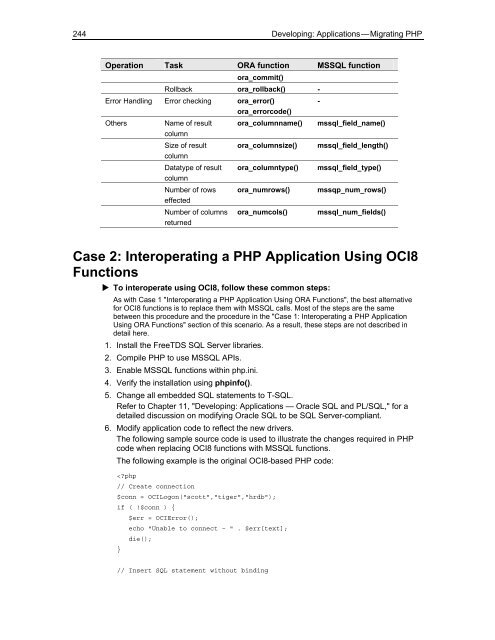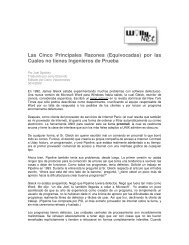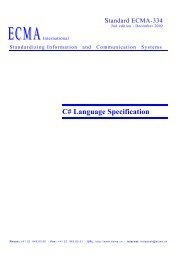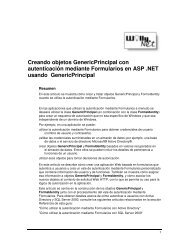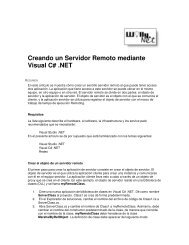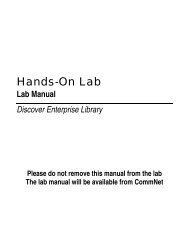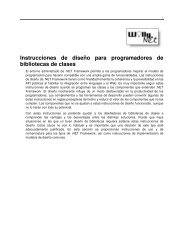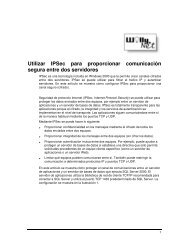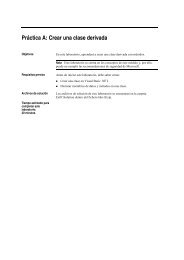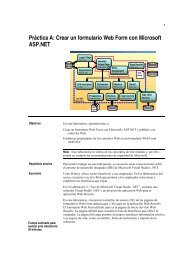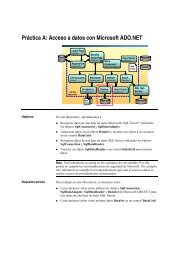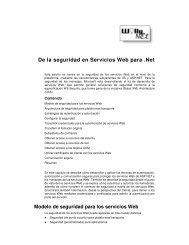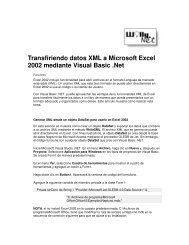- Page 1:
Solution G
- Page 5 and 6:
ContentsvDeveloping: Databases —
- Page 7:
ContentsviiIntroduction and Goals..
- Page 11 and 12:
Solution G
- Page 13 and 14:
Solution G
- Page 15 and 16:
Solution G
- Page 17 and 18:
Solution G
- Page 19:
Solution G
- Page 22 and 23:
2Introduction to the Microsoft <str
- Page 24 and 25:
4Introduction to the Microsoft <str
- Page 26 and 27:
6Introduction to the Microsoft <str
- Page 28 and 29:
8Introduction to the Microsoft <str
- Page 30 and 31:
10Introduction to the Microsoft <st
- Page 32 and 33:
12Introduction to the Microsoft <st
- Page 34 and 35:
14Envisioning PhaseTable 2.1: Major
- Page 36 and 37:
16Envisioning PhaseMaximize ROITCO
- Page 38 and 39:
18Envisioning Phase●●http://msd
- Page 40 and 41:
20Envisioning Phase●●●If ther
- Page 42 and 43:
22Envisioning PhaseFigure 2.1 repre
- Page 44 and 45:
24Envisioning Phase●Database Conn
- Page 46 and 47:
26Envisioning PhaseOracle</
- Page 48 and 49:
28Envisioning Phase●●●It is d
- Page 50 and 51:
30Envisioning PhaseOptimal Strategy
- Page 52 and 53:
32Envisioning PhaseRole Project res
- Page 54 and 55:
34Envisioning Phase●●●●●C
- Page 56 and 57:
36Envisioning PhaseConfiguration Ma
- Page 59 and 60:
Solution G
- Page 61 and 62:
Solution G
- Page 63 and 64:
Solution G
- Page 65 and 66:
Solution G
- Page 67 and 68:
Solution G
- Page 69 and 70:
Solution G
- Page 71 and 72:
Solution G
- Page 73 and 74:
Solution G
- Page 75 and 76:
Solution G
- Page 77 and 78:
Solution G
- Page 79 and 80:
Solution G
- Page 81 and 82:
Solution G
- Page 83 and 84:
Solution G
- Page 85 and 86:
Solution G
- Page 87 and 88:
Solution G
- Page 89:
Solution G
- Page 92 and 93:
72Developing: Databases — <strong
- Page 94 and 95:
74Developing: Databases — <strong
- Page 96 and 97:
76Developing: Databases — <strong
- Page 98 and 99:
78Developing: Databases — <strong
- Page 100 and 101:
80Developing: Databases — <strong
- Page 102 and 103:
82Developing: Databases — <strong
- Page 104 and 105:
84Developing: Databases — <strong
- Page 106 and 107:
86Developing: Databases — <strong
- Page 108 and 109:
88Developing: Databases — <strong
- Page 110 and 111:
90Developing: Databases — <strong
- Page 112 and 113:
92Developing: Databases — <strong
- Page 114 and 115:
94Developing: Databases — <strong
- Page 116 and 117:
96Developing: Databases — <strong
- Page 118 and 119:
98Developing: Databases — <strong
- Page 120 and 121:
100 Developing: Databases — <stro
- Page 122 and 123:
102 Developing: Databases — <stro
- Page 124 and 125:
104 Developing: Databases — <stro
- Page 126 and 127:
106 Developing: Databases — <stro
- Page 128 and 129:
108 Developing: Databases — <stro
- Page 130 and 131:
110 Developing: Databases — <stro
- Page 132 and 133:
112 Developing: Databases — <stro
- Page 134 and 135:
114 Developing: Databases — <stro
- Page 136 and 137:
116 Developing: Databases — <stro
- Page 138 and 139:
118 Developing: Databases — <stro
- Page 140 and 141:
120 Developing: Databases — <stro
- Page 142 and 143:
122 Developing: Databases — <stro
- Page 144 and 145:
124 Developing: Databases — <stro
- Page 146 and 147:
126 Developing: Databases — <stro
- Page 148 and 149:
128 Developing: Databases — <stro
- Page 150 and 151:
130 Developing: Databases — <stro
- Page 152 and 153:
132 Developing: Databases — <stro
- Page 154 and 155:
134 Developing: Databases — <stro
- Page 156 and 157:
136 Developing: Databases — <stro
- Page 158 and 159:
138 Developing: Databases — <stro
- Page 160 and 161:
140 Developing: Databases — <stro
- Page 162 and 163:
142 Developing: Databases — <stro
- Page 164 and 165:
144 Developing: Databases — <stro
- Page 166 and 167:
146 Developing: Databases — <stro
- Page 168 and 169:
148 Developing: Databases — <stro
- Page 170 and 171:
150 Developing: Databases — <stro
- Page 173 and 174:
Solution G
- Page 175 and 176:
Solution G
- Page 177 and 178:
Solution G
- Page 179 and 180:
Solution G
- Page 181 and 182:
Solution G
- Page 183 and 184:
Solution G
- Page 185 and 186:
Solution G
- Page 187 and 188:
Solution G
- Page 189 and 190:
Solution G
- Page 191:
Solution G
- Page 194 and 195:
174 Developing: Applications — In
- Page 196 and 197:
176 Developing: Applications — In
- Page 198 and 199:
178 Developing: Applications — <s
- Page 200 and 201:
180 Developing: Applications — <s
- Page 202 and 203:
182 Developing: Applications — <s
- Page 204 and 205:
184 Developing: Applications — <s
- Page 206 and 207:
186 Developing: Applications — <s
- Page 208 and 209:
188 Developing: Applications — <s
- Page 210 and 211:
190 Developing: Applications — <s
- Page 212 and 213:
192 Developing: Applications — <s
- Page 214 and 215: 194 Developing: Applications — <s
- Page 216 and 217: 196 Developing: Applications — <s
- Page 218 and 219: 198 Developing: Applications — <s
- Page 220 and 221: 200 Developing: Applications — <s
- Page 222 and 223: 202 Developing: Applications — <s
- Page 224 and 225: 204 Developing: Applications — <s
- Page 226 and 227: 206 Developing: Applications — <s
- Page 228 and 229: 208 Developing: Applications — <s
- Page 230 and 231: 210 Developing: Applications — <s
- Page 232 and 233: 212 Developing: Applications — <s
- Page 234 and 235: 214 Developing: Applications — <s
- Page 236 and 237: 216 Developing: Applications — <s
- Page 238 and 239: 218 Developing: Applications — <s
- Page 240 and 241: 220 Developing: Applications — <s
- Page 243 and 244: Solution G
- Page 245 and 246: Solution G
- Page 247 and 248: Solution G
- Page 249 and 250: Solution G
- Page 251 and 252: Solution G
- Page 253 and 254: Solution G
- Page 255: Solution G
- Page 258 and 259: 238 Developing: Applications — <s
- Page 260 and 261: 240 Developing: Applications — <s
- Page 262 and 263: 242 Developing: Applications — <s
- Page 266 and 267: 246 Developing: Applications — <s
- Page 268 and 269: 248 Developing: Applications — <s
- Page 270 and 271: 250 Developing: Applications — <s
- Page 272 and 273: 252 Developing: Applications — <s
- Page 275 and 276: Solution G
- Page 277 and 278: Solution G
- Page 279: Solution G
- Page 282 and 283: 262 Developing: Applications — <s
- Page 284 and 285: 264 Developing: Applications — <s
- Page 286 and 287: 266 Developing: Applications — <s
- Page 289 and 290: Solution G
- Page 291 and 292: Solution G
- Page 293 and 294: Solution G
- Page 295 and 296: Solution G
- Page 297: Solution G
- Page 300 and 301: 280 Developing: Applications — <s
- Page 302 and 303: 282 Developing: Applications — <s
- Page 304 and 305: 284 Developing: Applications — <s
- Page 306 and 307: 286 Developing: Applications — <s
- Page 308 and 309: 288 Developing: Applications — <s
- Page 310 and 311: 290 Developing: Applications — <s
- Page 312 and 313: 292 Developing: Applications — <s
- Page 314 and 315:
294 Developing: Applications — <s
- Page 316 and 317:
296 Developing: Applications — <s
- Page 318 and 319:
298 Stabilizing PhaseTestingThe Sta
- Page 320 and 321:
300 Stabilizing Phaseindividual com
- Page 322 and 323:
302 Stabilizing PhasePerfor
- Page 324 and 325:
304 Stabilizing PhaseFor example, w
- Page 326 and 327:
306 Stabilizing PhaseFigure 18.1Bug
- Page 328 and 329:
308 Stabilizing PhaseUser Acceptanc
- Page 330 and 331:
310 Stabilizing Phasechanges made t
- Page 333 and 334:
Solution G
- Page 335 and 336:
Solution G
- Page 337 and 338:
Solution G
- Page 339 and 340:
Solution G
- Page 341 and 342:
Solution G
- Page 343 and 344:
Solution G
- Page 345:
Solution G
- Page 348 and 349:
328 OperationsWindows Environment O
- Page 350 and 351:
330 OperationsSecurityFor detailed
- Page 352 and 353:
332 AppendicesOracle</stron
- Page 354 and 355:
334 AppendicesFigure A.2Ora
- Page 356 and 357:
336 AppendicesIn SQL Server, the te
- Page 358 and 359:
338 AppendicesProcess/Thread Archit
- Page 360 and 361:
340 AppendicesTransaction Architect
- Page 362 and 363:
342 AppendicesData DictionaryThe da
- Page 364 and 365:
344 Appendices●●●Using the BU
- Page 366 and 367:
346 AppendicesAvailabilityAvailabil
- Page 368 and 369:
348 AppendicesThe perfor</s
- Page 370 and 371:
350 AppendicesInfor</strong
- Page 372 and 373:
352 AppendicesQuery AnalyzerT he SQ
- Page 374 and 375:
354 AppendicesTable A.5: Network An
- Page 376 and 377:
356 AppendicesPerfor</stron
- Page 378 and 379:
358 AppendicesAppendix D: Installin
- Page 380 and 381:
360 Appendices7. Type the following
- Page 382:
362 AppendicesAppendix E: Reference


